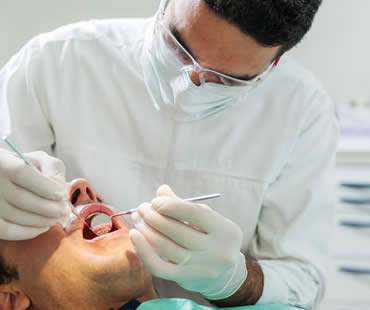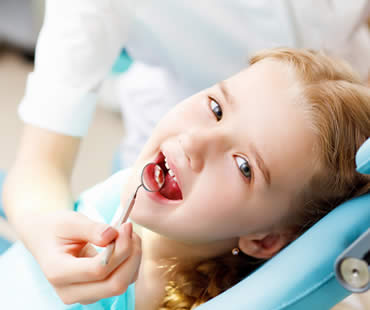
Using mouthwash is not a replacement for brushing and flossing, but instead is an addition to your oral care routine that can help you maintain healthy teeth and gums. If you’ve visited the mouthwash aisle at your local drugstore lately, you’ve seen that there is a giant selection of brands and types to choose from. It can be a bit overwhelming if you don’t know what purpose each one serves. Here is a description of the most common types of mouthwashes to help you choose.
Antiseptic
The goal of antiseptic mouthwash is to kill germs and bacteria in your mouth. It can also combat gum disease and persistent bad breath. Most dentists recommend that you discuss using antiseptic mouthwash with them before selecting this type, because they can help you decide if it’s needed for you. It can impact your sense of taste and can stain your teeth, so you want to be sure it’s helpful for you before using it.
Fluoride
The most common kind of mouthwash is fluoride, which utilizes the natural abilities of this mineral to strengthen your tooth enamel and prevent tooth decay and cavities.
Cosmetic
Designed to disguise bad breath, or halitosis, cosmetic mouthwash does not offer protection from problems like tooth decay. It can help keep your teeth clean and help rinse away food particles, but it is mainly for freshening your breath.
Combination
Mouthwash that combines purposes of the product is called combination mouthwash. It is meant to prevent tooth decay, maintain your oral health, and freshen your breath.
Prescription
Sometimes a prescription mouthwash is warranted for patients with gum disease or other types of decay. See your dentist to find out it this type of mouthwash would benefit you.
If you live in the Fernandina Beach area and you need a general dentist, contact us today.

It’s easy to put off a trip to the dentist if you’re not experiencing any pain or noticeable issues. Maybe it’s inconvenient in your busy schedule, maybe you don’t want to spend the money, or maybe you experience anxiety about dental visits. None of these are good enough reasons to forego proper dental care so that you ensure a healthy mouth and attractive smile.
Having regular checkups with your general dentist is important for a variety of reasons. Probably the most beneficial reason is to catch problems early, before they have time to become serious and negatively impact your oral health. Cavities and gum disease are both examples of issues that can wreak havoc in your mouth if left untreated, but if handled quickly they may disappear with as little as a fluoride treatment or change in your hygiene routine. Avoiding treatments like fillings, crowns, or root canals – not to mention the associated costs to your wallet and your schedule – are great reasons to see your dentist every six months!
Another benefit of regular checkups is a brighter, more beautiful smile. Even the best dental hygiene at home can’t reach every bit of plaque or tartar that accumulates on your teeth. Professional cleanings eliminate buildup to give you a more appealing smile, as well as removing harmful and stinky bacteria from your mouth.
Your overall health also reaps the rewards of consistent dental care. Oral problems can impact your general health through things like introducing dangerous bacteria into your body that can spread and cause various health risks. Also, your dentist may notice signs of health issues you might not realize, such as cancers or diseases or nutritional deficiencies.
Make your smile a priority and visit your general dentist regularly. Don’t let excuses get in the way of receiving the rewards dentistry has to offer.
If you need a dentist in Fernandina Beach contact us today

General dentistry offers exactly what the name implies: dental care related to the general maintenance of good oral health. The ideal way to look at dentistry is preventative, which means focusing on good oral hygiene and functionality before problems can take hold. Finding a qualified and skilled general dentist who you visit every six months for checkups is the best way to prevent serious dental issues and help you maintain excellent oral health.
A trip to the general dentist for you or any of your family members, no matter their age, is a smart way to keep your smile looking and feeling great. Your general dentist will help create the perfect dental plan that depends on your personal oral health and needs. A typical dental visit includes thorough examination, X-rays or other diagnostic tests, professional teeth cleaning, and any treatments that might be needed for your condition. If a certain treatment isn’t available through your general dentist, it’s likely that you’ll receive a referral to a reputable specialist to complete the work.
Every dentist is unique, so you’ll need to inquire about the specific treatments available at your dentist’s practice. Some common services that many general dentists provide include:
- Dental sealants
- Fluoride treatments
- Professional cleanings
- Gum scaling or recontouring
- Fillings
- Bonding
- Root canal therapy
- Crowns and bridges
- Dental implants
- Dentures
- Veneers
- Orthodontics
In addition to dental treatments, your general dentist will evaluate your at-home hygiene routine and make suggestions for improvement. You will learn proper brushing and flossing techniques, as well as learn about any additional products or practices that might improve your oral health. Your general dentist wants you and your family to have the best smiles and oral health possible, and will help you achieve that goal.
We treat patients from Fernandina Beach and the surrounding area

Across drugstore and grocery aisles, toothpaste options line the shelves. Brushing plays an important part in maintaining dental hygiene. With all the choices, you may feel like it’s a tough to make a decision. Knowing the difference between whitening toothpaste and natural toothpaste can help you decide the best option for your smile.
Cavity-fighting toothpaste
When used correctly, all toothpastes ward off cavities by removing plaque from teeth. Choosing toothpaste with fluoride will protect enamel from erosion and strengthen your teeth. Children under six shouldn’t use fluoride toothpaste because they can ingest too much and end up with white spots on their teeth from overexposure to the fluoride.
Whitening toothpaste
Although these options will remove staining, whitening toothpastes don’t work as well as professional teeth whitening. For temporary results and a brighter appearance, many people swear incorporate whitening toothpaste into their hygiene routines.
Antibacterial toothpaste
Some of the newer products have an antibacterial agent called triclosan that may help protect gums from the bacterial infections that cause gum disease. Since these toothpastes haven’t been on the market that long, the jury is still out on their effectiveness.
Natural toothpaste
Found in most health food stores, all-natural toothpastes are typically fluoride-free. Often, natural toothpastes contain ingredients such as peppermint oil, myrrh, or aloe to clean teeth and freshen breath.
Toothpaste for sensitive teeth
If eating ice cream or drinking coffee causes tooth pain, toothpaste designed to minimize sensitivity might be good for you. These compounds work by desensitizing teeth and blocking the tubules that reach the nerves in your teeth.
If you need a dentist in Fernandina Beach contact us today

Severely damaged, injured or diseased teeth can lead to not only cosmetic problems with your smile, but also functional ones. Your dentist may recommend dental crowns or dental bridges to treat your dental issues.
Dental crowns are a restorative dental therapy that covers the affected tooth completely, serving as the new outer surface of the tooth. A dental crown maintains the natural roots of a tooth and can prevent extraction. A dental bridge fills the gap left by one or more missing teeth and is affixed to bordering teeth with an anchoring crown.
Both dental crowns and dental bridges are made from a variety of materials that can be designed to match the color of your surrounding natural teeth. As opposed to removable prosthodontics such as full or partial dentures, dental crowns and bridges are permanently bonded to existing teeth or dental implants, allowing them to function and appear as natural teeth.
Dental crowns and bridges have a number of advantages and benefits, such as:
- Dental crowns protect the natural tooth after a root canal therapy, helping to prevent bacteria re-infecting the tooth that could lead to extraction.
- Dental bridges restore gapped or missing teeth, providing support to the surrounding teeth, preventing them from shifting in to fill the empty space and affecting your speech, bite and smile.
- Your dentist can typically place dental crowns and bridges in as few as two appointments.
- Dental crowns and bridges are both long-lasting, durable therapies, designed to protect your natural tooth for years to come.
- Dental crowns prevent bone loss by preserving the natural tooth roots, thereby stimulating the jawbone, preventing resorption, or shrinkage, of the bone following extraction.
If you have questions about what a dental crown or bridge can do to improve the form and function of your smile, talk to your dental professional today. You can restore your healthy smile and preserve it for years to come with a dental crown or dental bridge treatment.
We look forward to seeing you in our Fernandina Beach dental office

Finding the right dentist is an important decision because it’s a healthcare relationship that can last a lifetime. The need for dental care starts around age one and continues through senior adulthood. For routine dental care, you might choose to see a family dentist or a general dentist. Although there are some similarities, the two types of dentists have some unique aspects.
Services:
Both types of dentists offer routine services that are common to oral health care. This includes examinations, cleanings, x-rays, and fluoride treatments. Instructing patients about dental hygiene such as proper brushing and flossing is part of most family and general dentistry practices as well. Poor oral care can cause decay, infections, gum disease, or other problems. Both types of dentists also offer treatment for when problems arise, such as dental fillings.
Patients:
General dentists often cater to patients in a certain age range, but family dentists provide treatment for patients of all ages. Infants, children, adolescents, adults, and seniors are all able to seek oral health care from a family dentist. Each age group has unique needs and issues, but family dentists are skilled in caring for everyone.
Specializations:
Since they see all ages of patients, family dentists are skilled in a wide variety of procedures. They are able to diagnose and treat many oral health conditions, including gum disease and oral cancer. Typical procedures they offer include tooth extractions, root canals, fillings, crowns, bridges, and sealants. Some are able to perform specialty services like implants and veneers. Many patients enjoy being able to obtain treatment from their family dentist without having to see a specialist.
Benefits:
In addition to the benefit of getting a variety of treatments in one location, family dentists are also able to provide ongoing treatment for all household members. Children and parents go to the same location and can even request back-to-back appointments. Everyone learns the same dental care techniques that they can practice at home together. Family dentists encourage every member of the family to take pride in their oral health.
We treat patients from Fernandina Beach and the surrounding area







